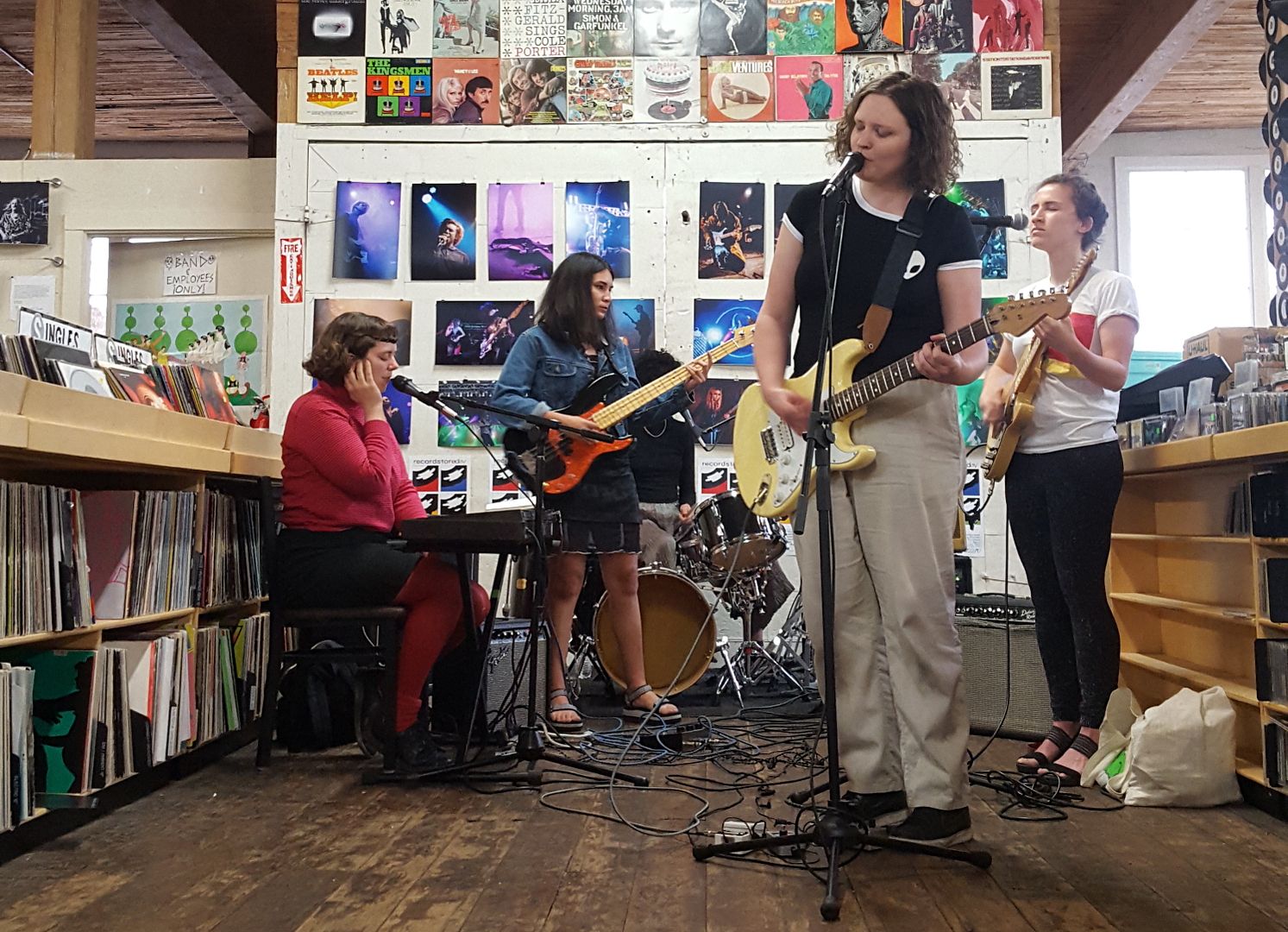On their band description, four-piece Seattle band Hoop bills itself as “anti-Metallica.”
Fair enough: It’s hard to imagine a bigger departure from the heavy-metal behemoths than Hoop’s brand of tender, feelings-driven soft rock. Lead singer Caitlin Roberts describes Metallica as a “corporation” or a “machine.” “I don’t know if you’ve seen their documentary about their songwriting process, but they fight so much, they’re just at each other’s throats, and they’re really wealthy,” she says. “They don’t speak from their heart.”
By contrast, Hoop makes jewellike, crystalline harmonies imbued with the delicacy and strength of spider silk. Fraught with feeling, their songs resemble the ethereal beauty of a ripple in a glimmering tide pool. They’re messy, too, though. Hoop’s songs are revealing, openly grappling with the dynamics of toxic relationships, or bearing pure, unfiltered expressions of emotions that other artists might not open up enough to articulate. In a world that increasingly conspires to squelch anything resembling real softness, Hoop’s honest declaration of vulnerability is nothing short of radical.
Hoop’s debut LP, fittingly titled Super Genuine (out now on Roberts’ own DIY label Decency Den Records), began with a song Roberts dreamed up while living in Olympia in 2012. At the time she was part of the project Autococoon, but knew that the tune, which would eventually become Super Genuine’s “Good Dregs,” felt like a “different entity”—it was short and spare, unlike the several-minutes-long multipart compositions she’d been making for Autococoon.
In 2014, Roberts began collaborating with producer Nich Wilbur of Anacortes band Hungry Cloud Darkening, and spent eight months in that sleepy seaside town, writing lyrics by the waterfront park six blocks from her home. After logging hours in the studio with Wilbur, the result was Super Genuine. Later, back in Seattle, Roberts formed Hoop with Leena Joshi, Pamela Santiago, and Inge Chiles (who also writes her own music as Ings), performing the songs she’d written as well as a few new ones the group created together.
Some songs are directly informed by Roberts’ time in Anacortes. “To Know Your Tone” is about giving and asking for support and the magic of overcoming isolation, and was inspired by Roberts’ stint at a kayak-rental agency in Anacortes, a gig she took to finance the recording of Super Genuine. Alone in the office, Roberts often found herself playing de facto therapist to lonely, nomadic kayak guides, who drifted from job to job with the seasons. As she listened to their romantic woes, she tapped into the power of empathy, a force that seems to guide Hoop’s music in general. “Anxious often, I have to focus, to listen, to know your tone,” Roberts sings. The word “tone” recurs a few times on the album—emotion made manifest, transmitted through sound.
Such interpersonal connection is something Roberts thinks about a lot. “I feel like growing up in American capitalist society tends to create a sense of rugged individualism,” she says. “Pull yourself up by your bootstraps, do everything yourself basically, just be responsible for yourself. There’s a lot of wisdom in that, but I feel like that was emphasized over community… To me, competition just defies everything that my heart knows to be true, like the feelings that I get when I work with other people, and how magical it is to work side by side with somebody and create something new with them.”
That collaborative, supportive spirit lies at the heart of Super Genuine. In addition to Wilbur, Roberts worked with Seattle singer/songwriter Briana Marela and Anacortes-based vocalist Allyson Foster, also of Hungry Cloud Darkening. When Roberts lost her voice, Foster stepped in to provide vocals on “To Know Your Tone.” Roberts also frequently teams with others for her independent label Decency Den Records, which she says “feels like a collective” because of her friends’ involvement, even though she’s technically the only member.

Photo by Kirsten Ourada
Hoop’s heartfelt harmonies seem spiritually descended from the Cranberries and other pining ’90s alternative bands. Because of her dad’s influence, Roberts grew up listening to bands like Third Eye Blind and Fastball. At age 8 she had already tagged along with him to see Semisonic (the one-hit wonders behind “Closing Time,” whom she’s caught live three times). The longing and wistfulness of those early bands still bleeds into her work in Hoop. “I think you can’t help but let the music that you grew up with inform your taste as an adult,” she says. “Looking back at music that was made in that era feels very cozy and nostalgic.”
Drawing on that aesthetic, Hoop worked with Seattle Weekly’s Sofia Lee to shoot a video for their aching track “Baseboards,” set to be released this summer. For the video, they drew inspiration from classic ’90s breakup music videos like Macy Gray’s “Do Something,” “Dido’s “Here With Me,” Lisa Loeb’s “Stay,” and Natalie Imbruglia’s “Torn,” channeling their straightforward, raw emotion.
“Baseboards” zooms in on the breaking point of an unhealthy relationship. Tremulously but with complete conviction, Roberts proclaims, “I am positive, I am positive, I can go no further.” Other tracks on Super Genuine similarly explore what happens when communication feels strained and when feelings are suppressed or suffocated. The plaintive, shivery “Not By Care” is slashed through with dark, breathy gasps, like a gulp of air between sobs—an eerie effect achieved by layering Roberts’ and Foster’s otherworldly vocals with keyboard and cymbals. And “Marlin Spike,” Roberts says, is about an imbalance in a partnership: “when someone is less effusive with their feelings than you’re being, but they’re still asking something from you, in a romantic context… They need emotional support, but they’re not acknowledging the emotional labor you’re doing [or] giving you emotional support in return.”
At a recent release party at Everyday Music, where the band was joined by Foster on vocals and keyboard, the members’ voices threaded together in harmonies, at times blending into a single silvery register. On “Folded Impulse,” Foster and Roberts traded lines like “When you push, I draw back” and “Then you hide and I want more,” the give-and-take of their voices rising and falling like a seesaw. It was beautiful to watch all five of them moving together as a unit, sensitive to each other’s smallest movements and seemingly joined by an invisible cord.
For the cathartic, cleansing final number, Roberts sang, “I am basking in my easy tone.” And as the resonance of the final note lingered in the air, it felt as though the band had found that tone together—a shared, wordless ease of expression.
music@seattleweekly.com








